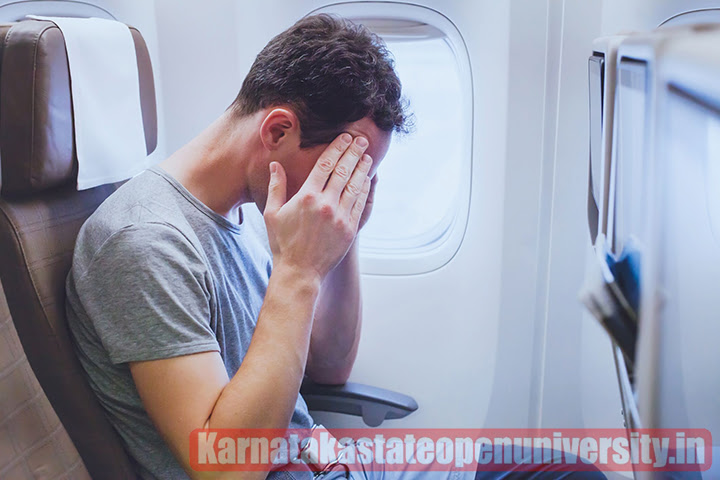How to Get Over Your Fear of Flying We’ve all heard the figure of speech “you’re bound to bite the dust in a fender bender than a plane accident,” yet that is little solace to the people who are justifiably a little irritated by the idea of flying many miles each hour in a hunk of metal exactly seven miles over the World’s surface. ( But here’s the truth: Based on recorded deaths, the National Safety Council estimates that one in 107 people will die in a car accident; however, there was insufficient data to even calculate the odds of dying in a plane crash.)
Flying can be a daunting experience for anyone, but it can be especially daunting for those who are afraid of flying. However, there are many ways to get over your fear of flying. One of the most effective methods is to employ the help of a professional therapist who can help you deal with your anxiety in an effective way. Additionally, you can take some simple steps like learning about your anxiety and preparing yourself emotionally for each flight. Finally, remember that flying is a normal part of life – it’s not something that needs to scare you!
How to Get Over Your Fear of Flying?
It takes a lot of courage and practice to conquer a fear of flying. However, it is doable with the right treatment. One of the most challenging accomplishments of my life was conquering my own fear of flying, which prevented me from flying until I was almost 30 years old. You have taken the first step if you are able to successfully identify the factors that cause your anxiety. It is essential to keep in mind that flight apprehension is not a singular phobia. The majority of people who have a fear of flying are claustrophobic, or they are afraid of being locked inside the plane and unable to choose when they want to get out. A phobia is a severe fear that is out of proportion to the threat, and flying fears are especially relevant.
The majority of “flight phobics” agree that flying is risky but terrifying. Their fear is difficult to reconcile with safety statistics. In spite of the fact that we realize our fears are not coherent, we can’t reason ourselves out of one. Flying can be a scary experience for some people. But if you’re ready to take the plunge and fly, there are a few things you can do to help ease your nerves. In this post, we’ll discuss some of the techniques you can use to get over your fear of flying and enjoy your trip. Ready to take the first step? Let’s get started!

Your Fear of Flying 2024 Details
| Article for | How to Get Over Your Fear of Flying In 2024 For According to Travel Experts? |
| How to Get Over Your Fear of Flying In 2024 For According to Travel Experts? | Click Here |
| Category | Travel |
| Official website | Click Here |
click here:- World’s Deepest Pool for Diving Is in Dubai
How to Get Over Your Fear of Flying?
Flying can be an exciting experience or a nightmare, but it doesn’t have to be the latter! In this article, we’ll discuss some tips on how to get over your fear of flying and make the experience as smooth as possible. From taking steps beforehand to preparing for the flight, to overcoming any anxiety you might have once you’re in the air, we’ll help you get through your flight with as little anxiety as possible!
Demystify turbulence
Unlike driving on a bumpy road or sailing in a choppy sea, turbulence is nothing more than erratic wind currents that cause planes to sway. In any case, there is absolutely no need to be concerned: Turbulence can be handle and minimize precisely by planes.
“Don’t worry that the plane is about to come apart when you look out your window and see the wing bobbing up and down as the plane experiences turbulence,” says pilot Korry Franke. Instead, be thankful because those flexing wings act as shock absorbers to smooth out the bumpy country road. In addition, technology of today is used to anticipate areas of turbulence so that pilots can steer clear of them and provide the smoothest possible flight.

Learn about built-in safety features
“Planes are supernatural yet ordinary machines. They give you strange sensations and make strange noises. They are intricate. Franke adds, “They operate in a system with few analogies to what people are familiar with.” Learn how planes are constructed to withstand emergencies to find solace. In any emergency, being prepared is essential, so knowing that you are prepared to deal with a variety of scenarios may alleviate any anxiety.
It’s likewise useful to do some exploration about air dissemination on planes to assist with easing your feeling of dread toward contracting Coronavirus on a flight. Natural air is persistently siphone into the plane — the lodge air is invigorated at regular intervals — and any reuse air is pushed through HEPA channels that eliminate 99.9 percent of pollutions, including microorganisms and infections. Additionally, a cabin’s air typically flows from the ceiling to the floor rather than from front to back, preventing contaminants from circulating. Obviously, if your seatmate sniffles, you could become tainted, yet those chances can be brought down with veil utilization, which is a necessity on all carriers.
Study your plane crash history
Even though it might seem counterintuitive, arming yourself with information about previous incidents in the aviation industry might help you feel more at ease while you are traveling. Try watching a show like Mayday, which is also known as Air Disasters. It educates viewers about plane crashes by explaining what went wrong, why it went wrong, and how the industry has changed to prevent similar incidents from occurring again.
Videos of every test that a plane must pass before it can fly are also available. These tests range from stress tests that show how far the wings can bend to extreme flight tests that push an aircraft to its limits. Planes are extremely difficult.
Resort Hotel In Greece For Travel According to Travel Experts
Talk to your flight attendants
Flight attendants are always available to assist you. We are your most effective ally. “We will continue to check on you and see how you are doing to ensure that you feel good during your flight,” says Jetsetter Chic founder and flight attendant Jennifer Jaki Johnson. That have been taught how to deal with fainting, hyperventilation, and a long list of other health problems that could happen on the plane.”
They are also experts in air safety: Airlines require flight attendants to attend in-person training once a year, which is supplement by ongoing online training to keep them up to date on emergency procedures. Johnson states, “Ensuring the safety of our passengers is our top priority.” So know that you’re in good hands.”
Find a distraction that works
However, not everyone is able to get lost in a good movie or podcast, which may cause them to lose track of the fact that they are in the air. According to travel blogger Nicole Ratner, “One trick I’ve learned is to focus on the opposite side of my brain.” As an example, since I write with my left hand, I will use my right hand to repeatedly write my name on a piece of paper whenever trouble arises. It helps me forget about the fear and keeps my mind sharp and focused on what’s in front of me.
Take a Flying Lesson
“I truly believe that most people do not have a fear of flying; “They’re afraid of being out of control or of what they don’t know,” Franke says. Take a flying lesson, if not in a real plane, at least in a simulator, to get rid of the mystery. As a result, you’ll have a much better understanding of how a plane works when you board your next flight as a passenger.
Pick a seat that helps you avoid your trigger
Choosing a seat is one of the few things that passengers can control on a flight. If you’re uncomfortable in the air, it’s worth paying a little extra for that option. Whenever you’ve figured out what precisely you’re apprehensive about with regards to flying, utilize your seat choice to assist you with staying away from your triggers. Avoid the windows if you are afraid of heights. However, if you must always be aware of what’s going on outside, choose a window seat. If you need to move around and feel confined, aisle seats can be helpful; upgrading to business or first class may also be beneficial in this situation.
Do it Anyway
“The most effective approach to confronting a phobia is exposure therapy.” According to Dr. Kutner, “exposure permits a person to come into contact with the feared stimulus and disprove their irrational, exaggerated cognitions surrounding the fear.” On the other hand, avoiding only serves to exacerbate fears. Therefore, getting on a plane is the best thing you can do for yourself if you really want to get over your fear of flying.
Bekal Fort Kerala All you need to Know In 2024
See a therapist
If your fear truly paralyzes you, you should probably get professional help. According to Dr. Rachel Kutner, a postdoctoral clinical psychology fellow, “mental health professionals can help individuals overcome a fear of flying through the use of cognitive behavioral therapy and exposure and response prevention.” Anti-anxiety medications can also be prescribe by doctors, which can certainly assist anxious pilots.
Do you want to try something different? Take a look at hypnosis. According to hypnotist Eli Bliliuos, “the subconscious mind can be program to release fear and anxiety while in hypnosis.” A claustrophobic experience, a tense flight, or even the time a parent expressed a fear of flying are all common causes of a phobia of flying. We help clients let that go through hypnosis.”
Conclusion
This was how my flight anxiety showed up for a long time. In ideal circumstances, the enclosed space of airplanes stoked every fear I had about losing control, even though I already had a diagnosis of generalized anxiety disorder and panic disorder. I had to take an increasing amount of Klonopin, a sedative that made me forget how to get to and from various locations around the world. To this day, I can’t remember how I got there.
When I learned that flying cause me so much pain, I was shock to learn that I became a travel journalist. However, if you want to see the world, you will have to face your fears at some point, whether you are a woman traveling alone or live in a rainforest ecolodge with spiders. Like my arachnophobia prevented me from exploring the jungle, my fear of flying did not prevent me from writing about travel for a living.
Related Posts:-
Where Can Americans Travel Right Now?
The 8 Best Duffel Bags of Tested By Experts

